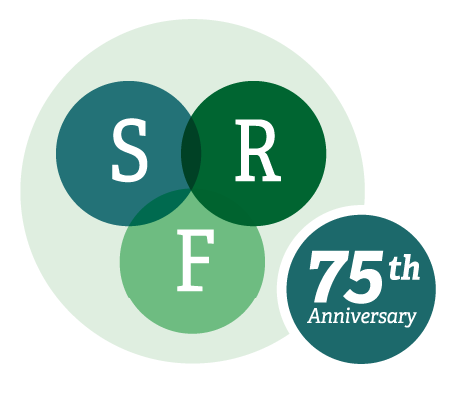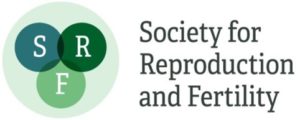In Memoriam
Professor Roger Valentine Short AM FRSE FRS FAA
31 July, 1930 – 6 August 2021
Professor Roger Short AM FRS FAA died on 6 August, 2021, aged 91 years.
Roger was a great scholar, researcher, teacher, mentor and raconteur. He touched many people in all the continents of the world. He will be missed, not only by his family and for his prodigious and extensive research output, but also for his friendship and the twinkle in his eye His contributions to reproductive science were recognised by SRF by awarding him the Amoroso Award and the Marshall Medal.
Roger Short was born on 31st July 1930 in Weybridge, Surrey, son of Arthur and Marion Short, and younger brother to Marcus. Sadly, Marcus died of rheumatic fever when Roger was only six years old. A stimulating education led him eventually to Cambridge where, whilst undertaking a PhD, he met Mary Wilson whom he married in 1958. They became parents to Nick, Fiona, Clare, and Kim. In 1982 Roger married Marilyn Renfree in Canberra and they had two daughters, Tam and Kirsty.
Roger’s childhood was where he started to developed his love of animals, his passion for learning and his powerful story-telling.
In an interview with Robyn Williams on the ABC Radio’s The Science Show, Roger recalled many parts of his early life
‘It all began on my mother’s knee. I can sort of remember it physically, but I certainly remember it intellectually with great clarity because I had a copy, which I have here, of Rudyard Kipling’s Just So Stories. Every night before going to bed, my mother read to me aloud a chapter from Just So Stories, and of course the one that really entranced me was ‘The Elephant’s Child’, about how the elephant got its trunk, and that’s what I have ended up doing some research on.
My father was an engineer, an amazing man. Every single aircraft flying to this day depends for its navigation on my father’s invention, which was the Pitot head airspeed indicator. I have got his original patent of 1912, and it is still unchanged on all aircraft. He was a great inventor, and I had to do something that made me feel different from him, although I was really in awe of him, I thought he was a wonderful father. And so I decided to get involved in biology. We were lucky to live on a tributary of the River Thames, so I spent every day of my life on my boat, which was called Imp, with my little dog Sam sitting in the bow, drifting down the river.
It was an absolutely fantastic childhood. That gave me a love of wildlife and I got very interested in fish. I found that I was rather good because I could get up at dawn and go spinning in the Thames and catch these great big pike which no one else could catch. I thought, ‘I don’t want to kill them, I want to put them back. But I want to show somebody that I’ve caught them.’ So I gill-tagged them and, at the age of 16 I wrote my first paper, a letter to the Field magazine on the growth and movement of pike in the Thames, by capture and recapture of my tagged pike.
Roger subsequently authored over 400 scientific publications!
Roger’s academic education began at the University of Bristol where he studied Veterinary Medicine. He was awarded a Fulbright Fellowship to the University of Wisconsin, where he graduated with a Masters in Genetics. After returning to the UK, Roger went on to gain his PhD under the supervision of Professor Thaddeus Mann at the University of Cambridge. After graduating in 1958 Roger continued his work in Cambridge as a Lecturer then Reader, and as a member of the Unit of Reproductive Physiology and Biochemistry. For his research there, he was awarded a Doctor of Science in 1969.
Roger’s research spanned 60 years and an incredible breadth of topics, from elephants to AIDS, from marsupials to mules and from condoms to camels, including the first camel-llama hybrid, Rama the Cama. Roger was the first person to isolate and measure progesterone and published this research in his first paper in Nature in 1956. He also initiated work on embryonic diapause in badgers and roe deer, and supervised projects on horse and elephant reproduction.
Roger’s mind was ever-curious and always thinking ahead to the next big idea. His practice was to tackle the big picture questions and let those following on fill in the detail. Whilst working in Cambridge, Roger realised that controlling human population growth was critical to wildlife conservation – triggering the next phase of his career on human reproduction. He typically coined a phrase on conservation action that if you are only talking it, it’s conversation.
In 1972, Roger moved to Edinburgh to establish the Medical Research Council Unit of Reproductive Biology, which he directed for ten years. During this period, he was also an Honorary Professor at Edinburgh University. He was elected a Fellow of the Royal Society in 1974: the highest scientific honour in the British Commonwealth. He was the recipient of many honours and awards, including Scientific Medals (Society for Endocrinology and Zoological Society, UK), Carl G Hartman Award (SSR, USA), the Amoroso Award and Marshall Medal (SRF, UK), and the Axel Munthe Award in reproductive biology.
In 1982, Roger moved to Australia to take up a Personal Chair of Reproductive Biology at Monash University in Melbourne. He was a gifted teacher covering the topics of contraception, world population growth, breastfeeding, abortion, human population, reproductive biology, fertility and especially HIV/AIDS: students all over the world still fondly remember his lectures. In fact, in his later years Roger would frequently encounter former medical students amongst his doctors – which would trigger lengthy discussions and reminiscing during medical appointments!
In Melbourne, Roger’s creativity and innovative thinking continued. He patented the use of melatonin to treat jet lag; he worked on HIV/AIDS and was a member of the WHO AIDs Taskforce in Geneva and, with his wife, Marilyn, studied the contraceptive effects of breastfeeding. He was a tireless campaigner for limiting world population growth (despite somewhat ironically having six children of his own).
Roger co-authored with Bunny Austin in the 1970s a series of Cambridge University Press text books “Reproduction in Mammals” that are still classics in the field used all over the world. But his favourite book was “Ever Since Adam and Eve”, a book he co-authored with Malcolm Potts that sold over a million copies and has been translated in Spanish, Italian, Korean and Chinese. In the past year, Roger could often be found in his favourite armchair re-reading Ever Since Adam and Eve, frequently commenting with a mix of pride and incredulity that “it’s fan-TAS-tic! So well written!”.
Roger left Monash University in 1995, but instead of retiring, took up a new position as Wexler Professorial Fellow at the University of Melbourne where he continued to share his passion for teaching and learning. Roger could often be found discussing news ideas and inspiring staff and students alike. He initiated a “Teach the Teacher” program for final year medical students to lecture to final year education students on puberty, contraception and abortion.
Roger took himself and his family on many exciting adventures. He spent 6 months in Uganda, taking Mary and young family along. During this time he worked on elephants. He subsequently visited various parts of Africa on many occasions. He went to Thailand frequently and always brought back ties…so his daughter thought it was called Tie-land! With his Australian family, he followed in Darwin’s footsteps to the Galapagos Islands, and each night he read the description of the island to be visited from Charles Darwin’s book ‘Voyage of the Beagle’. He and his family travelled widely both nationally and internationally.
Just before he died, Roger celebrated his 91st birthday at home with family. He passed away at home with the love and support of all his family on the 6th August 2021. He is survived by his wife, Professor Marilyn Renfree AO FRS FAA, and family in the UK and Australia.
Jock Findlay
Geoff Shaw
Peter Temple-Smith

